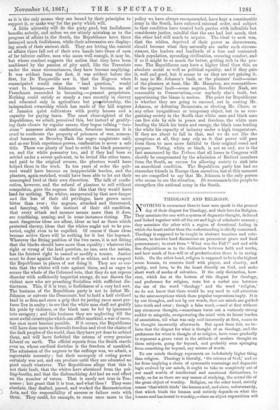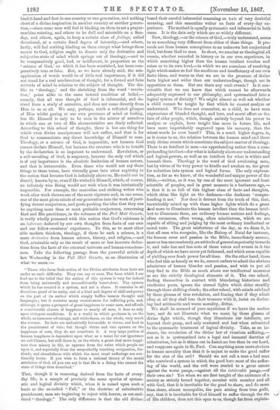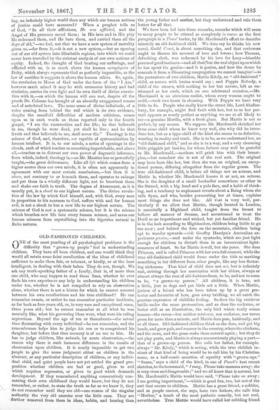THEOLOGY AND RELIGION. N .OTHLNG is commoner than to hear men
speak in the present day of their disgust for Theology, and their love for Religion. They associate the one with a system of dogmatic thought, deduced and linked together with all the art and logic of scholastic acumen ; they associate the other with a region of devotional feeling in which the heart rather than the understanding is chiefly concerned. Theology is supposed to be taught in abstract treatises and cate- chisms, to involve hard discussions on prevenient grace and final perseverance; to start from "What was the Fall ?" and end with fine disquisitions as to the distinction between faith and works, and how much of free-will or of predestination there is in saving faith. On the other hand, religion is supposed to be in the highest sense human, to concern itself with prayer, and charity, and purity, and love, to fix the heart directly on God, and make short work of modes of salvation. If the only distinction, how - ever, which lies at the bottom of this disgust for theology,. and preference for religion, were but a verbal one between. the use of the word ' theology ' and the word 'religion,' we do not know that there would be any need to call attention. to the misconceptions which these popular impressions imply. It is by our thoughts, and not by our words, that our minds are guided' into truth and error ; though a false word, —used at first without any erroneous thought,—sometimes turns out a curiously strong rudder to misguide, overpowering the mind with its latent burden of association, till what was only said incorrectly at first, comes to be thought incorrectly afterwards. But apart from this, we be- lieve that the disgust for what is thought of as theology, and the preference for what is thought of as religion, have come gradually to represent a grave twist in the attitude of modern thought on these subjects, going far beyond, and probably even springing from something far beyond, any misuse of words.
To our minds theology represents an indefinitely higher thing than religion. Theology is literally, the science of God,' and so far from implying a chain of systematic reasonings and dogmatic logic evolved by our minds, it ought to take us completely out of our small worlds of intellectual and emotional distinctions, to study, so far as there are any means of studying, the actual life of the great object of worship. Religion, on the other hand, strictly means 'that which binds' the human soul, and since, unfortunately, that which binds the human soul entirely depends on what the human soul has learnt to worship,—since an abject superstition will bind it hand and foot in one country or one generation, and nothing short of a divine inspiration in another country or another genera- tion,—since some men will feel it binding on them to set a prayer- machine rotating, and others to be dull and miserable on a Sun- day, and others, again, to keep a certain class of feelings, called devotional, at a certain fixed degree of intensity,—and others, lastly, will feel nothing binding on them except what brings them nearer to God, religion ought to denote only the derivative and subjective state of mind which springs out of theology,—and to be comparatively good, bad, or indifferent, in proportion as the science of God,' on which it has been nourished, has been com- paratively true or false. But, as we have already said, the mis- application of words would be of little real importance, if it did not stand for a real misdirection of thought, for a forced and false attitude of mind in relation to the subject of thought. The dis- like to theology,' and the shrinking from the word 'revela- tion,' point alike to the same inward condition of belief,— namely, that all true thought of God is inferential, and de- rived from a study of ourselves, and does not come directly from Him to us at all. We may, perhaps, catch a reflected glimpse of Him whilst gazing at our own processes of mind or feeling, but He Himself is only to be seen in the mirror of ourselves in which one or two of His characteristics are dimly reflected. According to this school of thought, there is but one thing for which even divine omnipotence will not suffice, and that is for God to communicate any direct knowledge of Himself to man. Theology, or a science of God, is impossible, not because God cannot declare Himself, but because the creature who is to benefit by the declaration is so impotent to understand. Revelation, or a self-unveiling of God, is nugatory, because the only veil which is of any importance is the absolute limitation of human nature, and that is irremovable. Even those who would not say these things in these terms, have virtually gone into utter captivity to the notion that because God is infinitely above us, He could not be directly known by Us, even if He wished it Himself, which, of course, an infinitely wise Being would not wish when it was intrinsically impossible. For example, the masculine and striking writer who week after week throws one of the most vigorous and, in one sense, one of the most pious minds of our generation into the work of justi- fying devout conjectures, and pooh-poohing the idea that they can be anything more than at most probable conjectures, concerning God and His providence, in the columns of the Pall Mall Gazette, is really wholly possessed with this notion that God's existence is an inference deduced by our own thoughts from facts of our own and our fellow-creatures' experience. To this, as to most other able modern thinkers, theology, if there be such a science, is a mere derivative from human science, history, and religion,—and God, attainable only as the result of more or less insecure deduc- tions from the facts of the external universe and human conscious- ness. Take the following passage from the powerful article of last Wednesday in the Pall Mall Gazette, as an illustration of what we mean :—
"Those who form their notion of the Divine attributes from facts are under no Finch difficulty. They can say at once, The facts which I see lead me to the belief that the author of this system is very far indeed from being universally and unconditionally benevolent. The system which he has created is a system, and not a chaos. It contains in all directions proof of its unity, and of a kind and degree of skill and power on the part of its author which simply baffles human thought and languages ; but it contains many contrivances for inflicting pain, and, although it opens a prospect of great happiness to some men, and affords a considerable chance of happiness to nearly all men, it does so only upon stringent conditions. It is a world in which goodness is, on the whole, an immense advantage, and wickedness, on the whole, very much the reverse. Its laws are undoubtedly favourable to virtue, and lead to the punishment of vice ; but though virtue and vice operate on the happiness of men, they do not constitute it. A very large portion of human happiness is dependent upon what as a name for our ignorance we call Chance, but still there is, on the whole, a great deal more happi- ness than misery in life, as appears from the value which people set upon it, and especially from the unspeakably touching resignation, for- titude, and cheerfulness with which the most cruel sufferings are con- tinually borne. If you wish to form a rational theory of the moral attributes of God, all you can say is that Ho is a Being who caused the state of things thus described."
That, though it is reasoning derived from the facts of every- day life, is a sample of precisely the same species of system- atic and logical divinity which, when it is raised upon such a basis as the so-called "Fall," or the doctrine of substitutive punishment, men are beginning to reject with horror, as cut-and- dried "theology." The only difference is that the old divines
based their careful inferential reasoning on texts of very doubtful meaning, and this masculine writer on facts of every-day ex- perience. The method is equally systematic and inferential in both cases. It is the data only which are so widely different.
Now, theology, —or the science of God,—truly understood, seems to us something very different from either of these things. It pro- ceeds not from human conceptions to an unknown but conjectured God, but from God to man. In short, we number as theological all events, whether recorded in history or in our own experience, in which something higher than the human intellect touches and raises us to its own level,—in which we are conscious of receiving light which makes us feel the smallness and insufficiency of our own finite ideas, and warns us that we are in the presence of divine facts higher and wider than our understandings, though not in opposition to them. But are there any such events ? Is it con- ceivable that we can know that which cannot be afterwards adequately expressed in our philosophy, and systematized into a logical system of divinity? We might almost as well ask whether a child cannot 'be taught by that which he cannot analyze or understand. Who does not remember, as a child, to have seen expressions of blended thought, and love, and moral effort on the face of elder people, which, though entirely beyond his power to analyze or explain, have taught him more in future life, and been more imperishably engraved upon his memory, than the wisest words he ever heard? This, in a much higher degree, is, as it seems to us, the relation between the human mind and those truly divine events which constitute the subject-matter of theology. There is an intellect in man—an apprehending rather than a com- prehending intellect—for what is infinitely above our understanding and logical powers, as well as an intellect for what is within and beneath them. Theology is the word of God awakening man, but by virtue of its very power to kindle and awaken us, too great for reduction into system and logical forms. The only explana- tion, as far as we know, of the wonderful and unique power of the Bible,—written, as it was, by one of the most ignorant and least scientific of peoples, and in great measure in a barbarous age,— is that it is so full of this highest class of facts and thoughts, which shine like light on the darkness—the darkness compre- hending it not.' Nor does it detract from the truth of this, that, inextricably mixed up with these higher lights which do a great deal more to illuminate the human intellect than the human intel- lect to illuminate them, are ordinary human notions and feelings, often erroneous, often wrong, often mischievous, which we are capable of sifting and judging by the most ordinary intellectual or moral tests. The great misfortune of the day, as we deem it, is that all men who recognize, like the Bishop of Natal for instance, the human error and passion in the Bible, immediately assume, more or less unconsciously, an attitude of general superiority towards it, and take less and less note of those voices and events in it the depth of which we have never yet fathomed, and which seem capable of yielding ever fresh power for all time. On the other hand, those who feel this as keenly as we do, cannot endure to admit the obvious admixture of human blunder and passion, and wish to put all they find in the Bible as much above our intellectual measures as are the strictly theological elements of it. The one school, finding themselves in contact with blundering historians and vindictive poets, ignore the eternal lights which shine steadily through these shifting clouds; the other school, with minds subdued by these gleams of true revelation, and fearing that if they admit alloy at all they shall lose their treasure with it, insist on declar- ing bad arithmetic and worse morality, divine.
We shall be accused of pure mysticism if we leave the matter here, and do not illustrate what we mean by those gleams of divine light which, though they illuminate our intellects, are beyond their grasp, and only scattered and lost when submitted to the systematic treatment of logical divinity. Take, as an in- stance, the revelation of the divine law of vicarious suffering,— not as it is systematized into a legal and immoral doctrine of substitution, but as it shines out in Isaiah no less than in our Lord, and reappears again in St. Paul. Can anything seem more obvious to human morality than that it is unjust to make the good suffer for the sins of the evil? Should we not call a man a bad man who contrived a system in which the good bore most of the suffer- ing of the world, and the evil were steeled to a great extent against the worst pangs,—against all the intolerable pangs,—of their own sin? Yet when we are first taught of the existence of a society so strictly bound together, member with member and all with God, that it is inevitable for the good to share, and de more than share, almost monopolize, the pain arising from true guilt, nay, that it is inevitable for God himself to suffer through the sin of His children, does not this open to us, though far from explain- ing, an infinitely higher world than any which our human notions of justice could have measured? When a prophet tells us of Gad, "In all their afflictions, He was afflicted, and the Angel of His presence saved them ; in His love and in His pity He redeemed them, and He bare them, and carried them all the -days of old,"—we feel, not that we have a new system of morality given us,—far from it,—it is not a new system,—but an opening out of our old system into illimitable regions, into which we could never have travelled by the strictest analysis of our own notions of -equity. Indeed, the thought of God bearing our sufferings, and afflicted with us, is as much above the human metaphysics of Deity, which always represents God as perfectly impassible, as the law of sacrifice it suggests is above the human ethics. So, again, the revelation to Moses of God under the form of the "I Am," however much mixed it may be with erroneous history and bad statistics, carries its own light and its own thrill of divine convic- tion with it,—on which the human will can rest, despite all the proofs Dr. Colenso has brought of an absurdly exaggerated census and of antedated laws. The same sense of divine infinitude, of a voice coming from behind the veil which is its ciwn evidence, despite the manifold difficulties of modern criticism, comes upon us in such words as those reported only in the fourth _gospel, "I am the resurrection and the life ; he that believeth in me, though he were dead, yet shall he live ; and he that liveth and that believeth in me, shall never die." Theology is the science of God, and, therefore, not capable of systematization by human intellect. It is, to our minds, a series of openings in the clouds, each of which teaches us something imperishable, and above -a11,—teaches us to distrust our own power of dogmatic inference, from which, indeed, theology is,—as Mr. Maurice has so powerfully taught,—the great deliverance. Like all life which comes from a higher source than our own minds, it is often not apparently in agreement with our most certain conclusions,—but then it is above, not contrary to or beneath them, and operates to enlarge and put them in a wholly different light, not to browbeat them -and shake our faith in truth. The dogma of Atonement, as it is -usually put, is a shock to our highest nature. The divine revela- tion of the law by which God himself, and, with God, every man in proportion to his nearness to God, suffers with and for human evil, is not a shock to but a new life to our highest nature. The -science of God is not a systematic science, but it is the science which breathes new life into every human science, and saves our human sciences from crystallizing into the bigotries natural to -finite natures.




































 Previous page
Previous page